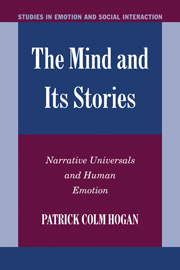Book contents
- Frontmatter
- Contents
- Acknowledgments
- The Mind and Its Stories
- Introduction: Studying Narrative, Studying Emotion
- 1 Literary Universals
- 2 Emotion and Suggestion: Lexical Processes in Literary Experience
- 3 Four Hypotheses on Emotion and Narrative
- 4 Writing Beyond the Ending: A Problem of Narrative, Empathy, and Ethics
- 5 Extending the Theory: Emotion Prototypes, Narrative Junctures, and Lyric Poetry
- 6 Testing, Revision, and the Program of Research in Narrative Universals: Ainu Epic and the Plot of Sacrifice
- 7 The Structure of Stories: Some General Principles of Plot
- Afterword: From the Emotional Nature of Narrative to the Narrative Nature of Emotion
- Works Cited
- Index
- Titles in the series
4 - Writing Beyond the Ending: A Problem of Narrative, Empathy, and Ethics
Published online by Cambridge University Press: 11 July 2009
- Frontmatter
- Contents
- Acknowledgments
- The Mind and Its Stories
- Introduction: Studying Narrative, Studying Emotion
- 1 Literary Universals
- 2 Emotion and Suggestion: Lexical Processes in Literary Experience
- 3 Four Hypotheses on Emotion and Narrative
- 4 Writing Beyond the Ending: A Problem of Narrative, Empathy, and Ethics
- 5 Extending the Theory: Emotion Prototypes, Narrative Junctures, and Lyric Poetry
- 6 Testing, Revision, and the Program of Research in Narrative Universals: Ainu Epic and the Plot of Sacrifice
- 7 The Structure of Stories: Some General Principles of Plot
- Afterword: From the Emotional Nature of Narrative to the Narrative Nature of Emotion
- Works Cited
- Index
- Titles in the series
Summary
In the preceding chapter, I argued that prototype narratives exhibit remarkable regularity, with detailed patterns of romantic and heroic tragi-comedy recurring prominently across unrelated traditions. Moreover, I argued that this pattern may be accounted for by reference to a cross-cultural constancy in personal and social prototypes for happiness – that is, romantic union and social domination, respectively. In connection with this argument, I noted that the heroic structure is more variable than the romantic structure. For the most part, this variability is not problematic and the various alternatives are easy to accommodate into our general account. However, there is one apparently anomalous variation in heroic tragi-comedies.
A surprising number of paradigm heroic tales include a peculiar ending, a sort of negative postscript to the achievement of the heroic goal. Moreover, this is common enough across genetically unrelated traditions to count as a universal. This raises a serious explanatory problem, for it is not at all clear why any story would, so to speak, “go beyond the ending” in this way, continuing the tale after the achievement of its guiding aim. After all, this is extremely uncommon in romantic plots. Indeed, its uncommonness in romantic plots suggests the basic reasonableness of our – or at least my – puzzlement over the heroic “continued” or “excess” ending, as one might call it. It also suggests that this odd ending may have the potential to advance significantly a research program in cognition, emotion, and narrative.
- Type
- Chapter
- Information
- The Mind and its StoriesNarrative Universals and Human Emotion, pp. 122 - 151Publisher: Cambridge University PressPrint publication year: 2003



